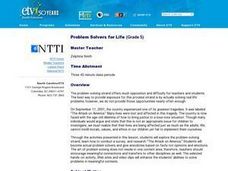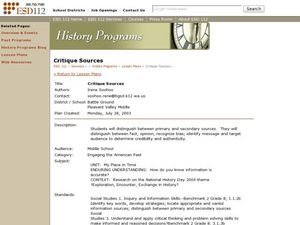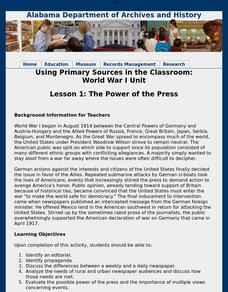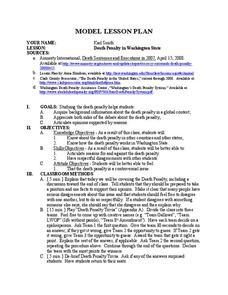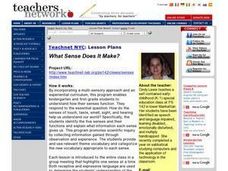Curated OER
Unknown Element Project
Students work with a partner to determine the identity of an unknown element based on given descriptions. Groups use classroom textbooks, encyclopedias, and science internet sites to identify their unknown element then write a report as...
Curated OER
Problem Solvers for Life
Fifth graders identify and explore the components of solving a problem. Students conduct a survey to collect, analyze and interpret data based on a given problem. Also, 5th graders use a variety of strategies to solve math problems,...
Curated OER
Evolving Views about Minority Rights in the United States
Tenth graders compare and contrast majority and minority outlooks on issues. In this social justice lesson, 10th graders research majority and minority values regarding the Salem Witch Trials, Plessy v. Ferguson, the McCarthy hearings,...
Curated OER
Critique Sources
Students distinguish between primary and secondary sources. They study about fact, opinion, and recognize bias. Students find out if information is accurate or not and report on it. For the final project students create an annotated...
Curated OER
Objective Versus Subjective
Young scholars examine the difference between subjective and objective statements, newscasts, and media. They discover that subjective is opinion based and objective is fact based.
Curated OER
Skateboard Renegade
Students read the novel, "Skateboard Renegade." Reading pairs read the novel with an eye out for characteristics of responsibility. They add to a responsibility chart as they find examples. They also read to identify vocabulary, cause...
Curated OER
Who Ever Heard of the Big Bang?
Learners examine the theories that attempt to explain the origins of the Universe. Some theories are based on scientific facts. Others find their source in folklore. The variety of beliefs systems are discussed as a motivating factor for...
Curated OER
Writing a Letter to the Editor
Learners examine the structure and elements of a letter to the editor. They identify letter elements, read and discuss newspaper letters, and write and submit a letter to a local newspaper.
Curated OER
Writing a Letter to the Editor
Students identify the main elements/structure of a letter to the editor. They brainstorm for thoughts and opinions on a specific topic and write a first draft of a letter to an editor of a newspaper. They give each other preliminary...
Nazareth College
Create Your Own Tornado
Third graders identify key concepts and definitions about tornados. They work in small groups of three to four to create mini-tornados. After reading Tornado Alert as a class, 3rd graders discuss tornados and fill out a KWL chart.
Curated OER
Genetics
High schoolers investigate public policy regarding genetic research and have formed an educated opinion on what they believe the government role should be.
Curated OER
The Parts of an Editorial
Pupils take notes as the teacher goes over the contents of an editorial and four types of an editorial. Students view an editorial and identify the structural elements in the sample as well as identify the type of editorial they are...
Curated OER
The Sculpture of Henry Moore
Eighth graders complete a unit of lessons on the characteristics of Henry Moore's sculpture. They examine and discuss examples of Moore's sculpture, identify the defining characteristics, write an essay, and create a sculpture in the...
Curated OER
Juvenile Delinquency
Ninth graders analyze and interpret historical research by examining, analyzing, and forming opinions regarding primary resources. They compare/contrast social conflict, its causes and effects, in regards to continuity and change over time.
Curated OER
The Power of the Press
Students identify an editorial and propaganda, discuss differences between weekly and daily newspapers, analyze needs of rural and urban newspaper audiences, and evaluate possible power of the press and importance of multiple views...
Curated OER
Destination New York City
Young scholars identify the physical characteristics of New York City and it's attraction to tourists from around the world. They recognize how the physical environment can affect the development of a city. They identify the major...
Orange County Department of Education
Dancing Rainbows: A Pueblo Boy's Story
Third graders identify the main ideas illustrated in the story "Dancing Rainbows." They identify details from the story that show respect toward self and others. Students write a paragraph to illustrate how the Tewa Indians show respect....
Curated OER
The Death Penalty
Students examine how people are punished in the American justice system. In groups, they identify the four different theories of punishment and how it is used in the justice system. They use the internet to read arguments for and against...
Curated OER
Animal Tracks
Second graders study the different tracks that animals make. They identify similarities and differences in the tracks and formulate opinions based on facts.
Curated OER
Pick Up a Litter Bit-Earth Day
Students investigate the effects of litter on the environment. In this environmental activity, students read the statistics on pollution and identify the effects it has on the Earth. Students develop a plan to clean up their local...
Curated OER
Uncovering The Truth
Students investigate the social and religious contexts that surrounded the Salem Witch Trials. The research is guided using the worksheets included in the lesson plan. The culminating assignment is writing an editorial of personal...
Curated OER
What Sense Does It Make?
Pupils identify the five senses and their functions and explain what information each sense gives us. They collect information gained through observation and experiences. They practice identifying new vocabulary words from the word wall.
Curated OER
Bias vs. Perspective: An Inevitable Aspect of Journalism?
Students explore the types of media that U.S. teens prefer the ways in which viewers identify and account for journalistic bias. They explore the ways in which media shapes one's opinion or affects their judgment.
Curated OER
Universal Love
Students discuss the importance of various cultures getting along with one another. Individually, they think of a time in which they helped someone who was worse off then them and share it with the class. To end the lesson, they...



